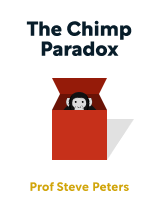

This article is an excerpt from the Shortform book guide to "The Chimp Paradox" by Steve Peters. Shortform has the world's best summaries and analyses of books you should be reading.
Like this article? Sign up for a free trial here .
What is The Chimp Paradox Stone of Life? How can it help you to understand yourself? What does Steve Peters mean by your inner computer?
Your Stone of Life is the set of beliefs and values that control how you see and experience the world. This includes beliefs like “life is unfair” and values like “family is more important than work.” Steve Peters argues that your personal Stone of Life impacts your relationships, self-esteem, and chances of success.
Below, learn how to apply The Chimp Paradox Stone of Life theory to your own life.
The Chimp Paradox: Stone of Life and Context
In order to fully understand The Chimp Paradox Stone of Life, you should first understand what Peters means by the Computer. Your Computer is a set of beliefs, habits, and knowledge that allows you to make most of your decisions without thinking about them. It automates your actions so that you don’t have to think carefully about, for example, how to make a cup of coffee every time you do it. Because its reactions are automated, your Computer makes decisions approximately four times faster than your Chimp does and about 20 times faster than your Human.
Because your Computer is a record of habits of behavior, it acts as a guide when your Chimp and Human aren’t sure how to react to a situation. They’ll check with your Computer to see how they’ve reacted to previous situations in order to figure out how to act in new situations.
When you’re born, your Computer is an empty program. As you grow, your Chimp and Human input their learned behaviors and beliefs into your Computer. Because these beliefs and habits are learned, and not innate in the way that the Chimp’s instincts are innate, you can remove or relearn any beliefs or habits you decide to, if you put the effort in. Unfortunately, most of us don’t, and consequently, we let our Computer do our thinking without questioning it.
Four Elements
Your Computer has four elements that drive it. These elements are key to understanding The Chimp Paradox Stone of Life:
- Autopilots: positive beliefs or habits
- Goblins: negative beliefs or habits that are hard to remove
- Gremlins: negative beliefs or habits, but ones that are removable
- Stone of Life: record of values and beliefs you live by.
What Is the Stone of Life?
The Chimp Paradox Stone of Life is the collection of beliefs and values that define how you see the world and what you see your purpose as. It’s the reference source that your Autopilots and Gremlins look to for guidance on how to act. Here are the key components of The Chimp Paradox Stone of Life:
- Beliefs: Your beliefs about how life works are created by your experiences and your education, and they influence how you respond to events. For example, if you believe “life is unfair,” you might not object if you and your friend both buy a large popcorn at a movie but her container is over-full while yours is only two-thirds full. You might chalk this up to life’s unfairness and forget about it. However, if you believe “life is fair,” then this situation might bother you a lot.
- Values: Your values are the moral and ethical principles you hold. For example, your value may be “lying is wrong” or it may be “lying is okay if it helps you.” The difference between beliefs and values is that your beliefs are formed by observed experience, whereas your values are personal standards of right and wrong.
- Purpose: Your purpose is the overriding meaning you give your own life. It’s your reason for being—whatever advice you would give your great-grandkids as you lie dying, if they asked you what they should do with their lives. The advice you’d give them should be the advice you yourself live by.
Understanding The Chimp Paradox Stone of Life can help you to work through your beliefs and values. In doing so, you can improve your mindset by challenging unhelpful beliefs.

———End of Preview———
Like what you just read? Read the rest of the world's best book summary and analysis of Steve Peters's "The Chimp Paradox" at Shortform .
Here's what you'll find in our full The Chimp Paradox summary :
- Why we struggle to control our urges, succumb to temptation, and sabotage our own success
- How to manage your inner chimp to become happier, more balanced, and successful
- Why your psychological world is like a solar system with 7 planets






